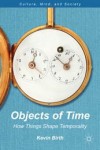A written calendar, then, is not so much as a cognitive tool to assist the reckoning of time, but a cognitive and cultural tool that can either promote social coordination or intersubjective senses of uncanniness, or even both, as in the case of the Jewish calendar. Calendars as artifacts are tools of power and social coordination. There also is an important contrast between complex calendars that require trained experts to interpret them versus simple calendars that almost anyone can use. The former are associated with … [Read more...] about Expert versus Lay Calendars — Thoughts from “Objects of Time”
Objects of Time
How would you describe your “time consciousness?”
While reading Kevin Birth‘s Objects of Time: How Things Shape Temporality, I wondered if weekends provide an opportunity to tell time differently. There is a danger in viewing the clock as necessary for certain cognitive tasks simply because we use it for those tasks. The importance of clock time in twenty-first-century economic practices cannot be used as grounds for assuming that it was necessary for economic practices in the medieval period. This misconception is key to the view of medieval timekeeping as … [Read more...] about How would you describe your “time consciousness?”
“What, then, is time?”
As some of you know, I've been enjoying ESN blogger/mentor Kevin Birth's provocative Objects of Time: How Things Shape Temporality (Palgrave Macmillan, New York, NY: 2012). Augustine of Hippo wrote, "What, then, is time? If no one asks me, I know; if I want to explain it to someone who asks me, I do not know" (1997 [ca. 397-98], 256). The question stumps us for quite different reasons. We surround ourselves with cognitive artifacts to tell us what time is, and the time these artifacts represent is demonstrably … [Read more...] about “What, then, is time?”
